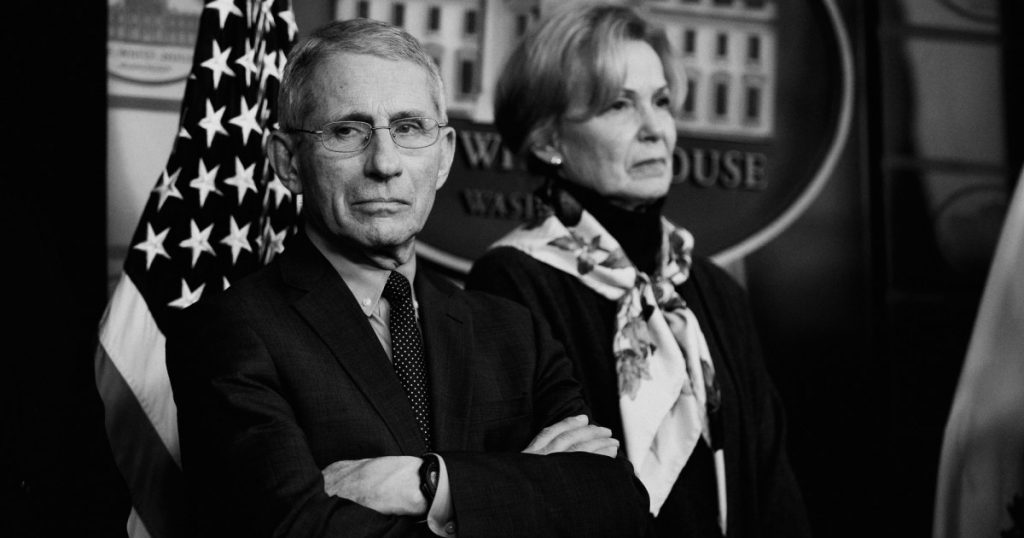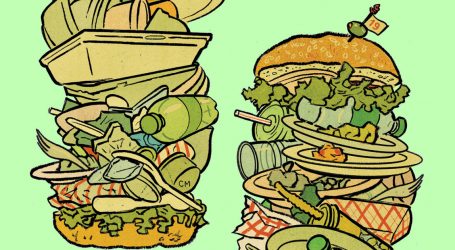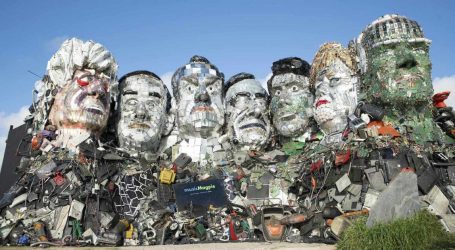Dr. Anthony Fauci Is the “Perfect Man for This Moment.” If Trump Sidelines Him, We’re Screwed.
Dr. Anthony Fauci and Dr. Deborah Birx at a White House briefing by the coronavirus task forceManuel Balce Ceneta/AP
For indispensable reporting on the coronavirus crisis and more, subscribe to Mother Jones’ newsletters.Once I began recovering from COVID-19, I wanted to understand what it means to be part of a growing cohort of survivors: What was happening in my body? And how should I think about my membership in this strange new class of people? I wanted to hear from scientists, survivors, and others who have been on the front lines of outbreaks before, to learn how I and others like me might help kickstart life after the plague.
That reporting led me to one of my own heroes, Peter Staley, a veteran HIV/AIDS activist and a central figure in ACT UP, a group that used the tools of direct action and civil disobedience to put AIDS on the map and crack open access to medical treatment—work that was featured in the 2012 documentary How to Survive a Plague.
Staley has also collaborated with Dr. Anthony Fauci and Dr. Deborah Birx, the top scientists on Trump’s coronavirus task force. In this interview, republished below, Staley reflects on how to keep Fauci and Birx in the room and in Trump’s ear during consequential tussles over public policy, as internal disagreements inevitably break into public view. (Over the weekend, Axios reported a heated exchange between Fauci and Trump’s anti-China trade adviser, Peter Navarro, over the use and efficacy of the malaria drug hydroxychloroquine.)
Losing just one of the top scientists to a Trump tantrum or a Twitter roasting is too perilous, Staley warned. “We shouldn’t be relying on just two experts to fight this thing,” he said. “We’re in a very dangerous position.”
This interview has been edited for length and clarity. You can also listen to it on the latest episode of the Mother Jones Podcast. Don’t miss Staley’s recollections of wine-soaked dinners with Fauci.
Tell me about your current work, and how you’re doing.
I’ve been doing AIDS activism around PrEP, the drug that blocks HIV infections, including working with leading public health officials on that issue. People like Anthony Fauci and Deborah Birx.
A bunch of us have leaped into COVID activism. Many of us have gotten used to this, when new pandemics hit, being very drawn to it because, frankly, we get triggered. We see politicians acting poorly almost from the get-go. It reminds us of what we all went through.
The world considers us, rightly, one of the most connected patient advocacy groups. We’re in this unique position of knowing all the players that fight epidemics, whether it be political leaders, or epidemiologists, or public health officials, or researchers, or front-line docs. So we’re well-positioned to run interference when issues arise.
What does “run interference” mean?
When New York City’s mayor was not listening to his public health experts as quickly as he should have early in this crisis, we looked for all sorts of tactics and methods for putting a fire under his ass. We were trying to drum up, stir up, and throw! Eventually, he got to a place where he is now very quickly deferring to the public health experts.
But we had a real crisis there for two weeks. He was sitting down with 30 people, and the public health experts were outnumbered. He was going with the more comforting advice. That’s a classic dangerous mistake that politicians make during the beginning of an epidemic. You just want to pull your hair out. Every day you lose, the fallout is exponential down the road.
Peter Staley in 2013.
I listened to a podcast this week from some Republican politicos who were all musing about how we’ll have to wait until this all plays out to judge Trump’s response to this pandemic. But that is just so crazy. It’s so false because 90 percent of what Trump needed to do needed to happen in February, and it didn’t. So we know now. We don’t have to wait until the end. We know now that he messed up big time.
All your work during an epidemic has to be loaded in the front end. That first month is the reason we might have 100,000 to 200,000 deaths in the US. Yes, everything after may prevent a million deaths, but the 100,000 to 200,000 deaths were preventable. Very preventable, and Trump didn’t do it. He didn’t do it. The deaths are all on his head, as far as I’m concerned. The blood is all on his hands. The people dying now are Trump deaths, hashtag #TrumpDeaths.
For those of us lucky enough to have seen How to Survive a Plague, the brilliant David France documentary about your work, ACT UP, and the early medical activism around HIV, we’ve seen you tussle with health authorities. What kind of historical echoes are you feeling right now? How is Trump receiving medical advice from the establishment?
I’m not sure we heard much at the beginning. He had gutted the [National] Security Council’s pandemic working group, whose sole job was to bring a new pandemic to a president’s attention as soon as it was starting. It was probably a combination of the distrusting of science and expert advice, but also the fact that he was actively trying to unravel everything Obama created.
I don’t know exactly when Fauci was called in to actually see the president, but from what I’m piecing together, it was pretty late in the process. Everything was too little too late.
Listen to James West’s conversation with veteran AIDS activist Peter Staley on this episode of the Mother Jones Podcast:
Peter, you’ve had a lot to do with Dr. Anthony Fauci. You’ve been quoted elsewhere as friends, and you speak of him with great respect. The respect you have for him has solidified over the years?
Yeah, I consider Fauci one of the great heroes in the fight against HIV/AIDS and continue to work with him on that fight. We meet and talk fairly regularly. As part of that ongoing fight, a bunch of us had another “Fauci Dinner,” as we call them, four years ago now. Right after he turned 75. And we asked him, “Tony, do we have to start finding a replacement? You’re 75!” It was a major worry of ours because his wealth of experience fighting HIV/AIDS, we still needed it.
He cleared that up pretty strongly and convincingly. He said, “No, I think I’ve got a good 10 years left in me,” which would make him 85. He mentioned how he was still running every day and that his resting heart rate was better than it was when he was running when he was 50 years old. He felt great. And that he really wanted to, like us, finish the job we had started.
That was the primary motivation for wanting to die at his desk: the hope that he could be there when we actually got vaccines that worked against HIV. We’ve been working with him ever since to finish that work, finish that job. He was central to the creation of PEPFAR, which has saved millions of lives around the world. There are now 24 million people taking HIV therapies around the world.
To clarify, that’s the foreign policy instrument under George W. Bush that was a global health initiative?
Right. Started by what, at that point, was the worst president of our lifetimes. Fauci helped convince that president to do what ends up being Bush Junior’s greatest legacy, and that is saving millions of lives of people with HIV around the world. Tony was really the architect of designing that program and figuring out how to thread that needle and get into the State of the Union speech. It’s had bipartisan support ever since. I think we’re seeing much the same from him lately with COVID, and even more recently with HIV. Trump announced a domestic AIDS plan for fighting HIV/AIDS in a State of the Union address, and that shocked his base and shocked everyone. Tony’s fingerprints were all over that.
He’s working his Fauci magic in the Trump administration now. I noticed you said he’s the only guy in Washington who Trump can’t fire. Is that true?
Yeah, I think his job is incredibly secure. That’s actually never been my worry. First off, he’s a civil servant, so Trump can’t fire him directly. He would have to tell HHS Secretary Azar to do it. I’m pretty convinced that it would be a Saturday night massacre [laughs]. But he could, overnight, just like [Robert] Redfield, the CDC director, he could be sidelined. He could still be filling a seat at the task force meeting, but Pence wouldn’t call on him. He would no longer be taken from the task force meetings into the Oval Office for one-on-one time with Trump. That’s when he would lose all influence against COVID-19.
Because the man is charming, right? I imagine that in person, he has that “X-factor” that can bring people on board, one-on-one?
Exactly. That’s why he’s kind of the perfect man for this moment. He has this rare combination of being one of the leading experts in the world on fighting epidemics combined with personal skills that allow him to interact with political leaders with very little scientific expertise in a way that very quickly engenders trust. He never talks down to people. You meet him and you very quickly realize that he’s the smartest guy in the room, but he doesn’t treat you that way at all. He doesn’t talk down to you at all. He reaches a hand out and pulls you up the learning curve with him, very quickly and easily. And all of a sudden you start feeling smarter because you’re getting it.
He’s doing all of this with a New Yorker, Brooklyn “let’s have a beer together” accent, or in our case, a couple hundred bottles of wine over the last three decades!
He never bullshitted us, but we knew we were being wined and dined. We knew he was charming. We knew there wasn’t a homophobic bone in his body.
I’ve been noticing the Twitter echo chamber reacting to some of the more obvious messaging to Trump by Dr. Deborah Birx, where it seems, to those of us watching without the decoder ring you have, to be a bit like blowing smoke up his ass. How useful is it for us to be criticizing her in this moment?
I think some of it has been useful and some of it hasn’t when it comes to Dr. Birx. I met her a few times. When I taught at Harvard in 2016, I invited her to be one of the guest speakers. I came into this COVID stuff with huge respect for her based on what others were saying. I’ve watched those friends who adore her become quite shocked and worried over the last couple weeks at many of her statements.
I think we’ve been trying to put them into two categories. While the progressive Twitterverse has slammed her harder for the comments that seemed to ingratiate herself to Trump, that’s actually the category of statements that most of the AIDS activists who work with her are willing to let slide. We’re willing to write those off as tactical, as a way for her to stay at the table and to keep her voice as one that he listens to, knowing that that is Mission No. 1 right now for all of us. If you want to save lives during COVID, Mission No. 1 is keeping Tony Fauci and Deborah Birx’s voice trusted in Trump’s ear. So whatever they need to do to do that, they get a pass in my book.
But she had been coupling that with a mischaracterization of actual facts and data. She has mischaracterized the modeling that came out of the UK. She has been dismissive of frontline health care workers’ alarming warnings about ventilators. And she mischaracterized the state of the epidemic in vast areas of the country. So when she starts playing fast and loose with the facts, that just raises huge red flags for all of us. And quite a few of her friends let her know it. I think she got the message. Fingers crossed that she kind of got swept up in Trump’s propaganda machine for 10 days and now has a clearer head and won’t misspeak again.
But it’s not something that isn’t fixable. Frankly, at this point, we’re in a very dangerous position. It’s like Trump and his foreign policy. At the beginning of his administration, he was surrounded by adults in the room. And then he slowly started firing all the adults and hiring sycophants on foreign policy, whether it was his generals or his foreign policy establishment. And now there are no experts in the room on foreign policy. It’s just sycophants.
Now we have an epidemic. He brings in some expertise, but not many, and now a few have been sidelined. We’re really down to two. We’re down to Birx and Fauci, and that’s not a good place to be in. We shouldn’t be relying on just two experts to fight this thing. And if we lose Birx, then we’re in a very dangerous place. So, I would rather help her stay in the room and hope that she gets better at it. And definitely, I hope she stops bullshitting the American people.
I want to turn to this predicament of my own. As you know, I’ve recovered from COVID-19, and have been trying to enroll in various plasma trials. [Read about that here.] The trials are regulated by the FDA under typical blood bank rules: Men who have had sex with men in the last 12 months can’t donate. What do you think about that, both as a matter of AIDS activism and specifically for this particular moment, when it seems critical to have healthy 38-year-old gay men like me, who have recovered from COVID-19, to be helping out?
I have quite a few gay friends who are recovering from COVID right now. So the group is quickly expanding. The fact that you are being blocked from helping in an incredibly positive way to save lives is just utter craziness. For me, as a long-term AIDS activist, it makes me want to scream because folks may not realize this, but a lot of what AIDS activists helped build is now being used to fight COVID.
Two examples. The largest clinical trial system at NIAID, which is the National Institutes of Allergy Infectious Disease, the division at NIH that Tony Fauci runs, is being used for COVID trials. This clinical trial system that AIDS activists helped create with patient advocates as part of the system, and it’s been running smoothly for decades now, that’s stepping into the breach to quickly launch COVID trials.
Second example. Gilead just announced that Remdesivir, one of the possible treatments for COVID, has been granted expanded access by the FDA to let tens of thousands of people use it outside of the clinical trials.
There have been various versions of expanded-access language added to FDA regulations. Almost all of it got written between 1987 and 1992, ACT UP’s first five years. All right?
So all of these regulations that are allowing wider access to COVID therapies right now were because of AIDS activists. And the whole reason the FDA is able to act so quickly now is because of what we helped build. And to tell us now, this community that created much of the system that our government uses to fight epidemics, to say “no, thank you” to this community when we want to individually help to save lives, something’s really wrong with that. It triggers all the feelings we felt during the early years of the AIDS crisis when the country was just saying, “We don’t care.” Just leaving us to die. This policy is going to cost lives.
[Since speaking with Staley, the FDA, in a major announcement, said it will reduce donation restrictions for gay and bisexual men from a 12-month abstinence window to three months. “Progress!” Staley texted me. “But they still need to include a no-window exception for these plasma studies, using HIV viral load tests to assure safety.”]
How do you think we come together to beat this thing back, and what’s your diagnosis for our optimism right now? Are you optimistic?
Well, I’m able to tap a little of optimism that I wasn’t able to tap during the first few years of AIDS activism. Our activism was about turning the entire country around to actually pay attention. And then it was about finding treatments that we really didn’t even know if they were out there. So a lot of us didn’t know whether we would live long enough to see the fruits of our activism.
Today, we actually had the knowledge even before COVID started of how to nip it in the bud. And what the world is going through is a failure of political leadership to use that knowledge and use those tools. But those tools are still there. And if political leaders start letting the scientists run things, which we’re being to see, then things will turn around.
So it’s a mix. It’s a mix of knowing we can beat this and being very triggered by the fact that politicians let this get as bad as it did.
And very triggered and horrified that I know people who have died. Terrence McNally was a man who I’ve adored from afar, whose plays I’ve seen all through the AIDS years, who himself had managed to avoid the virus and get through those plague years only to be felled by COVID and the stupidity of another Republican president.
Hope is just…it’s there. People need it. People need to know that we can get through this. I am hopeful we will. But there’s a lot of justifiable anger and sadness, and the sadness is just starting. We’re going to lose a lot of people. We’re all going to know someone. We’re not going to be able to have the funerals. At least we had funerals during the plague years. We often talk about the funerals of how they emotionally scarred us because we were going to so many, but it’s also what allowed us to get through those years, the fact that we could all gather and hug.
One of the great lessons I took from How to Survive a Plague, and as a gay man growing up in the shadow of the AIDS crisis, is how useful outrage was to you as an activist, the channeling of that rage, the anger and frustration, the throwing of ashes at the White House, and staging die-ins, and being angry as a tactic of pushing hard change through. That’s one of the lessons I’ve taken from my gay heroes who were able to reset the stage. Maybe optimism was the wrong question for you. Maybe it should be about rage, and how to direct it?
Yeah. No outrage, anger. It is completely legitimate. I am filled to the brim with it right now, and that’s totally legitimate. And the trick for all of us is using that in a helpful way. Sometimes it’s almost impossible to do. You got to kind of explode.
But the difference between a useful activist and just a frothing activist is one who channels their rage. All of us have to figure out how to channel it. If you find yourself spending more than five minutes out of your day trying to try and to destroy Deborah Birx, maybe you’re mistargeting your anger. Because there’s a guy called Donald Trump who you should be laserlike focused on.
And even within your own world, there’s a level of misinformation, and conspiracy theories, and Trump supporters, and right-wing media, and anti-science people on the left and the right who are making things worse. We all need to target our anger to those enemies and fight against that. We need to defend science at all costs. We need to listen to science, scientists, and the experts, and defend them at all costs. This is all about the targeting, and anger can screw that up.
That’s my message to everybody. That anger is legitimate. That rage is totally legitimate. But it’s useless unless you target it well and use it for good. That will make you a great activist.





